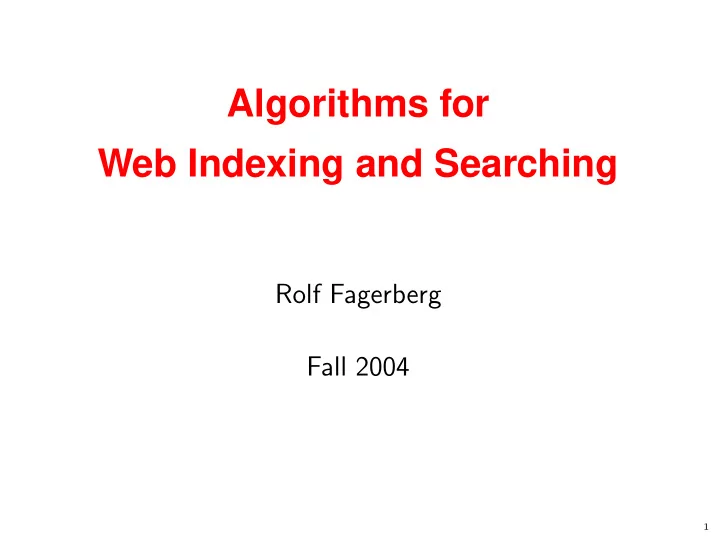

Algorithms for Web Indexing and Searching Rolf Fagerberg Fall 2004 1
The Internet • Very large amount of information. • Unstructured. How do we find relevant info? 2
The Internet • Very large amount of information. • Unstructured. How do we find relevant info? Search Engines! 2
The Internet • Very large amount of information. • Unstructured. How do we find relevant info? Search Engines! History: 94: Lycos,. . . : First search engines 96: Alta Vista: many pages indexed . 99: Google: many pages indexed and good ranking. 2
Modern Search Engines Impressive performance. E.g. : • Searches 4 . 3 · 10 9 pages (Sept 04). • Response time ≈ 0,1 seconds. • 1000 queries per second. • Finds relevant pages ( Do you feel lucky. . . ? ) 3
Modern Search Engines Impressive performance. E.g. : • Searches 4 . 3 · 10 9 pages (Sept 04). • Response time ≈ 0,1 seconds. • 1000 queries per second. • Finds relevant pages ( Do you feel lucky. . . ? ) Who uses bookmarks any more? 3
Not So Modern Search Engines Advanced methods do make a difference (example, circa 1998): princess diana Engine 3 Engine 1 Engine 2 Relevant and Relevant but Not relevant high quality low quality index pollution M. Henzinger Web Information Retrieval 4 4
Course Motivation How does work? 5
Course Motivation How does work? ⇓ How do search engines work? 5
Course Motivation How does work? ⇓ How do search engines work? ⇓ Algorithms for web indexing and searching 5
Subjects – Search Engines Aquiring data Storing data • Web crawling • Data structures storing: – Keywords – URLs Processing data – links – full pages • Parsing • Distribution of data storage • Indexing • Compression of data. • Sorting • Duplicate removal 6
Subjects – Search Engines Searching in data Ranking results • Query types • Word based (number and position of occurences) • Algorithms • Link based (PageRank, others) • Query dependent • Query independent • Other heuristics (e.g. re- cognition of home pages, news, . . . ) 7
Related Subjects • String algorithms and data structures. • Techniques for massive data sets. • Internet protocols • Classical IR (high-dimensional vector spaces). • Search engine evaluation. • Graph models of the web. • Data mining. • Similarity measures (nearest neighbor, clustering, latent semantic indexing). • Web caching. • Web applications of game theory (auctions, mechanism design). 8
Formal Course Description Prerequisites: DM02 Literature: Research papers Evaluation: Implementation project, oral exam Credits: 7.5 ECTS Course language: Danish or English 9
� ✁✂ Project Implement a search engine Goal: Search engine for domain • Large scale project. • Programming groups (crawling, indexing, ranking, query interface). • Cooperation. 10
Informal Course Description In the course you will meet: • Real life search engines • Algorithms and data structures • Mathematical models • Hands-on experience • Teamwork 11
Recommend
More recommend